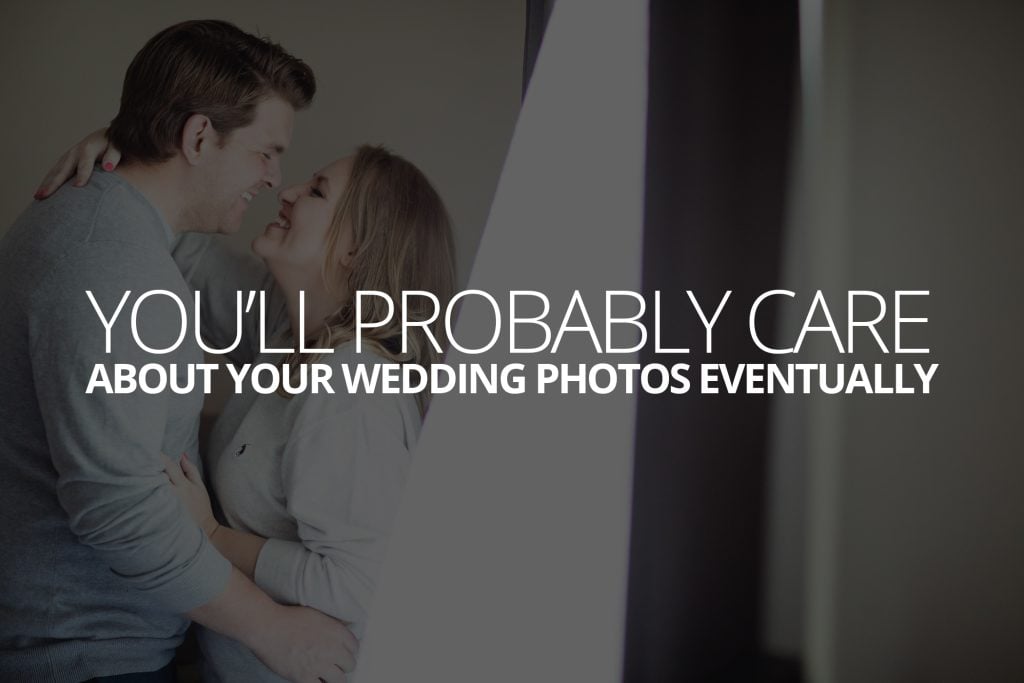Over the weekend, while covering a local stage production at a community theater, I ran into a couple of friends from a previous phase of life. I hadn’t seen these two, at least more than very briefly in passing, since their wedding about six years ago. It was very nice to see them; catching up a little bit, however short-lived, was refreshing.
Of course, as is the usual custom when catching up with someone you haven’t seen in a while, you tend to start with your largest overlapping interests. In this case, their wedding was the big news that’d happened since the last we’d really talked, and in that time, our wedding business here had also really boomed and become a more household name among our circles.
So, naturally, we talked about the wedding business and then more specifically about their wedding. I sensed there was some mild awkwardness because they didn’t hire us, and perhaps felt somewhere deep down that they should have because of our friendship. Of course, feelings like those are unnecessary. We have never taken a friend’s decisions to work with another photographer personally. Everyone is different in their style, priorities, and idiosyncratic preferences. Not to mention their budget. So, with a little reassurance, we got past that quickly and then we got to talking about how their photos ultimately turned out. Boy, was it a doozie. Lets just say it didn’t turn out as expected.
I was sympathetic, because what this couple ultimately learned was that they hadn’t weighed their priorities and desires accurately for the long term, and it left them wishing they had hired us.
Now, as a photographer, there’s a certain bittersweetness to hearing these kinds of sentiments. It feels good, of course, for someone to praise your work and wish they had it. But on the other hand, I don’t want anyone—good friends least of all—to feel like their wedding came up short of what they really wanted to be able to look back on. That just sucks. Whether style and aesthetic are a big deal to you or not, virtually everyone eventually wants to preserve these memories and an awful lot of people miscalculate and overestimate the quality of their body’s natural memory abilities.
The first mistake this couple made was to judge their budget for photography as more important than the nostalgia they would one day want to experience. They didn’t think they could spend more than $1000; for most couples, that’s just not enough unless you win the proverbial ‘wedding lottery’. The second mistake was to try and meet that budget by hiring out the job to a relative and an acquaintance who was working to build a portfolio. Of course, anyone could be forgiven for making these kinds of mistakes. Unless you’re in the habit of deliberately examining your priorities, it’s very challenging to guess what doesn’t matter a whole lot to you today, but might matter a lot tomorrow. It’s also difficult to guess how an under qualified photographer might mess things up. A lot of people don’t mind if the photos are kind of crappy, so long as they exist. But photos being crappy is not the worst way an under qualified photographer can cause problems.
Unfortunately, crappy photos isn’t the only disappointing thing that this couple experienced. Although the wedding day itself had no major flaws and the amateur photographers they had on the job did not create a disruption, the bride told me that a few nights after the wedding while they were on their honeymoon, she woke up in a cold sweat realizing they hadn’t taken a single photo of just the two of them together. The wedding day was fluid, and almost no one who isn’t a photographer is in the habit of thinking about which photos have and haven’t been taken. This bride hadn’t considered that this is one of the responsibilities a professional takes on. She was heartbroken, but it was too late.
We continued our chit-chat for a little while before discussing the possibility of an anniversary session to make up for what they missed on their wedding day. I hope they follow through on that, and if they don’t, I hope they find a perspective on their experience that helps them enjoy the images they do have; albeit, in a different way.
I’ve been thinking about this conversation a lot over the last few days. My friend’s story is not a unique one. Every day, someone, somewhere, is setting themselves up for the same disappointment. On the one hand, I want to respect the diversity of priorities people come to the table with. But on the other hand I feel a certain responsibility to shout when someone is about to jump without a parachute. And, in a manner of speaking, a wedding day is a lot like that jump. You can’t redo it, you can’t change your mind once it’s happened, and how it unfolds will reverberate through the rest of your life. Of course, whether that’s a good thing or a bad thing is mostly up to you.
People tend to mistake the ‘complexity’ of a wedding with all the minutia that goes into making the wedding event happen. But, trust me when I say this, all that stuff pales in comparison to the four-dimensional, emotional complexity underneath. You invite relatives you only see once a year because you’re going to see them next year. You spend a lot of time and money picking out a dress because it’s the dress and you want to remember how it felt to wear it. You hire a photographer, not because you’ll forget what the centerpieces looked like, but because you’ll forget how it felt to see your loved ones around them.
Most couples are not thinking on this level, and they’re unfortunately at a much higher risk for disappointment. However much time you spent visiting caterers and picking out appetizers, if you spent that much time just thinking about how you want to feel in 10 years, you’ll make much, much better wedding day decisions. You’ll stress a lot less about trivialities the wedding industry likes to emphasize—like what kind of cake you got or whether you sprang for uplighting—while giving a lot more care and attention to those things with veins extending throughout the rest of your life. Unless you’re a baker, and you made the cake yourself, it just isn’t going to matter in a couple of years, and there is no universe in which uplighting at your wedding makes your life demonstrably better in the long run. (Actually that’s not true, that universe probably does exist, but it’s off topic and a little too nerdy for this blog; tweet at me if you’re looking to open that can of worms).
At the end of the day, I’m not here to tell you how to spend your wedding budget, or what to prioritize in the context of your life and values. But, what am telling you is to slow down and dig into what’s underneath this special event. Get in there and look closely at the feelings, emotions and priorities that are hiding below. Almost none of them are really about the specifics of your wedding day, but rather an aggregate of what you want your life to become. That is what really deserves your time and attention (and yes, your budget), and it’s those things that you will carry with you, and that your wedding photography should exist to support. So think on it, really, really think on it.
If you’re still looking for a wedding photographer, we’re ready to get in there with you and see what’s under the surface. Our images are not made for weddings, they’re made for life—and just so happen to come into existence at your wedding. Check out the wedding photography page here on our website to learn more!

